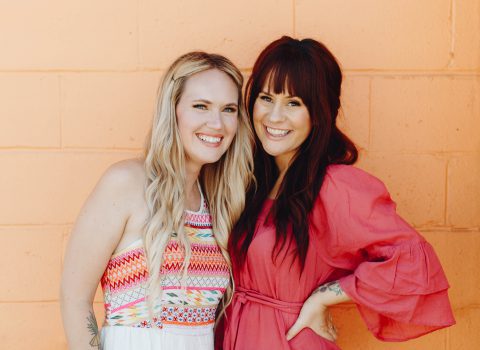Pillows are such an easy way to change up your living space with the change of seasons, but this fall I practically needed a matchmaking service to connect me with a pillow to have and to hold. There was a lot I wanted in just a little pillow! I wanted a graphic style but with a chill, bohemian vibe; natural fabric, but comfortable to the touch; and a perfectly autumn color scheme that wouldn’t feel out of place during the rest of the year. I could’ve gone with the standard plaid pillow from a Target end cap, or I could actually create my own pillow that felt more like a kindred spirit than a decorative accessory. Obviously I chose the latter!
This project is also a great craft for those wanting to give quilting a try. You’ll use some basic quilting methods, without the daunting commitment of completing a large blanket. This pillow is very simple to make, but I broke it down into detailed steps so you can feel confident making it without me standing beside you to hold your hand (although I would if I could). Check it out!
Supplies:
-1/2 yard and 1/4 yard of coordinating linen fabric (I purchased mine from this fine linen Etsy shop.)
–100% cotton quilt batting (1′ x 12′ piece)
-small piece of laundered cotton muslin (1′ x 12′ piece)
-coordinating thread
-coordinating embroidery floss (5 bunches)
–pillow batting
–quilt basting spray (Optional: You may use safety pins instead.)
Tools:
-sewing machine
–rotary blade
-steel ruler (a cork-backed ruler is preferable to prevent sliding)
-cutting mat
-sharp fabric scissors
-straight pins (sharp quilting pins are preferable)
–darning needle
-iron
–free motion sewing machine foot
Step One: Cut your laundered fabric into nine 4″ x 8.5″ rectangles—five rectangles in the dominant color and four in the coordinating color. Using a rotary blade, steel ruler, and cutting mat will ensure precise, uniform rectangles, making the assembly process much neater.
Step Two: Pin together the rectangles, one row at a time, making sure the good sides (if your fabric has better sides) are facing each other. Then machine stitch the ends together, creating a 1/4″ hem. Make sure you make each hem exactly the same distance from the edge of your material to ensure the rectangles match up when the entire piece is assembled.
Step Three: Iron open the seams before pinning and machine stitching together each row to complete the quilt top. Make sure all seams have been ironed open on the backside once the quilt top is complete.
Step Four: Stack the three layers of your quilt (the top, the batting, and the muslin) like a sandwich, with the good sides of the facing out and the batting in the middle. Join together the layers by spraying with quilt basting, or join them with safety pins across the entire surface of the top quilt (like step ten in this Animal Play Mat project). I prefer spray basting the layers because I can make sure the fabric is perfectly smooth and connected all across the surface, making the layers less likely to shift and pucker while machine stitching.
Step Five: Trim away excess batting and material, using the quilt top as your guide. Then use a water soluble pen or pencil to draw any lines where you would like to do top stitching. I did top stitching in the ditches (the lines where each contrasting rectangle is connected), and I also stitched four additional lines as shown above right.
Step Six: Use your sewing machine to do the top stitching on quilt. You may want to use a spring-loaded free-motion sewing machine foot, which will help you accomplish two things that may be important to you: 1. When you drop down the feed dogs of your sewing machine (the textured grips that feed material under the sewing machine foot) in combination with using a spring-loaded sewing machine foot, your layered fabric will not bunch up and pucker as you sew. 2. A free-motion sewing machine foot will allow you to feed the fabric into the needle from any direction, so you can easily stitch swirls, circles, or trace over any design that you drew in step five.
The downside of using a free-motion sewing machine foot with the dropped feed dogs is that it’s difficult to both control the speed of your sewing as you manually feed the material into the needle. It also can be tricky to keep straight lines compared to using the pressure applied by a standard foot and the feed dogs. If you haven’t used this free-motion method before, I definitely recommend practicing on scrap material before top-stitching on your quilt.
Step Seven: Cut a piece of your dominant color material to the same size of your quilt. Then stack this piece and the quilt with the good sides facing each other. Pin them together and machine stitch 1/4″ from the edges. Be sure to leave about a 4″ wide opening so you can reach your hand inside to stuff the pillow.
Step Eight: Flip your pillow case right-side out and wash and tumble dry it to create a textured top. The 100% cotton batting will slightly shrink in the dryer, creating crinkled texture, which I happen to love and definitely wanted for my comfy bohemian pillow. But if you aren’t a fan of the textured crinkle of a worn quilt, simply skip the washing process and move on to the next step.
Step Nine: Stuff your pillow with batting and use coordinating thread to stitch close the opening.
At this point you have a lovely quilted pillow that would make a great addition to your pillow collection. But I wanted to take it a step further and add some extra bohemian flare—tassels!
Step 10: Attach tassels to each corner of the pillow.
To Make Tassels:
1. Use one bunch of embroidery floss (still wrapped in its packaging) for each tassel. Tie it in the middle with a tightly knotted piece of matching embroidery floss. (The fifth bunch of floss is for tying and wrapping the tassels.) Make sure to leave a long end hanging free for attaching the tassel to the pillow.
2. Wrap together the end of the bunch with floss (first knotted tightly) and tuck the ends of the wrapping in through the tassel.
3. Remove the embroidery floss packaging, cut the loops open at the ends, and trim up any unevenness.
4. Use a darning needle and the excess embroidery floss from step one to stitch the tassels to the corners of the pillow, threading the excess thread through the pillow after knotting the tassel in place.
This patchwork pillow is the perfect combination of simple and chic. The comfortable vibes created by the quilting process and natural materials makes it feel simple, but the addition of the tassels pushes it into chic territory.
Are you looking to add more graphic appeal and textural comfort to your home? This pillow should be your next project! Let us know if you give it a try! –Mandi
Credits //Author and Photography: Mandi Johnson. Photos edited with the NEW A Beautiful Mess actions.




9 Comments
That pillow is super cute. http://www.hannamarielei.com
Hi,
I’ve been following your blog for quite some time now, and I love your content and the lessons you share with your readers.
Every time I read a post, I feel like I’m able to take a single, clear lesson away from it, which is why I think it’s so great. I will definitely share your content with my readers.
When you get a chance visit my website Bell’s Branding, Inc. at http://www.bellsbranding.com Where I discuss the latest in technology and web design. If you are ever interested in a web design or mobile application to take your business
to the next level I’m your girl.
I specialize in top quality branding services to increase revenue for you and your company.
Best of luck,
Erin L Bell XOXO
http://www.bellsbranding.com
Branding businesses for the future!
Looks wonderful, I love the tassels!
https://www.makeandmess.com/
Thanks for sharing…
Oh this looks so cute! DIYs are always so fun!
xx Sofia | SofiaaDot
It’s beautiful, thanks for the idea!
The question is – is it as comfy as it looks?
Such a cute pillow! I especially love the tassels.
Absolutely! 🙂 I’m so glad I sprung for the high quality linen material. -Mandi